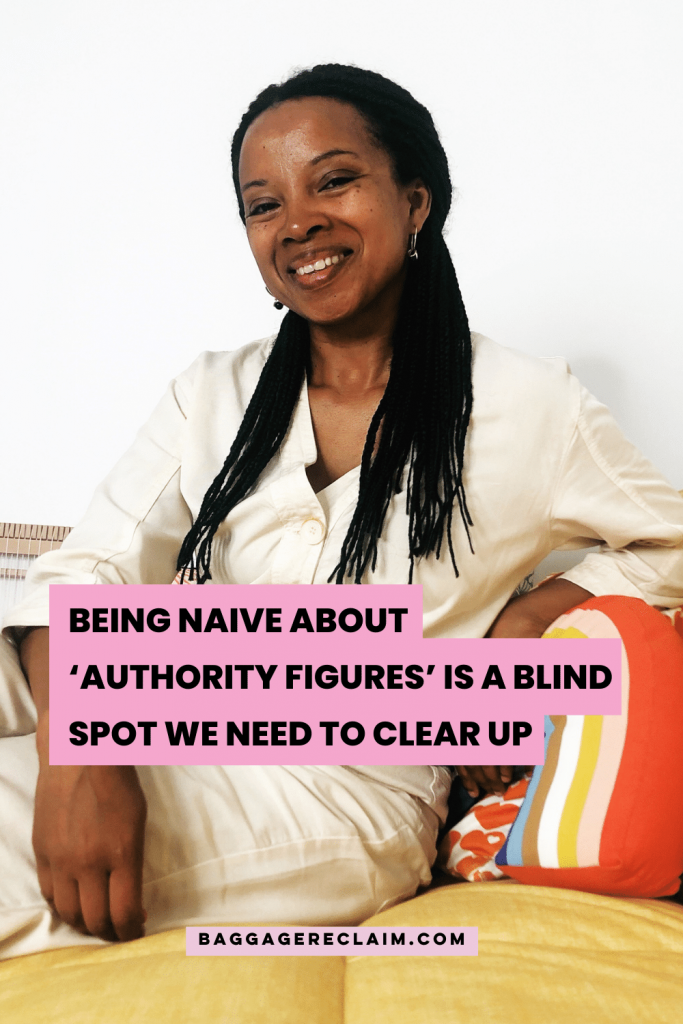Sometimes we can be wilfully and even dangerously naive about people we perceive to be authority figures.
We decide, for instance, that because of someone’s profession, they always do the right thing. It’s this mistaken belief that authorities always have everyone’s best interests at heart. That, and the dangerous belief that anyone in a position of authority ‘knows best’ and has proved themselves to be exemplary. It then becomes shorthand for ‘They are trustworthy’. It’s why, over the years, I’ve heard from a frightening number of people, mostly women, who’ve been romantically involved with (and abused) by people who worked in the police force, army, church, or were a teacher, all-round ‘hard-working’ ‘good guy’, or known for their apparent financial success or intellect.
We do it with our parents and caregivers.
It’s assuming that by sheer extension of their authoritative role, including depending on them for survival, we can expect love, kindness, nurturance and protection. And if and when they don’t live up to our expectations, we assume it’s our fault or deny the issue’s existence to keep them on a pedestal. Incidentally, this makes us ripe for repeating this pattern in our adult interpersonal relationships. We’ll keep putting ourselves in a child role in our interpersonal relationships. Keep in mind, too, that someone doesn’t have to be an authority for us to feel and behave as though they are.
Naivety about ‘authority figures’ is why we might tune out a manager or boss’s unsupportive, inappropriate or downright abusive behaviour. They’re in charge, right? So surely they have our back and will protect us? Actually, not always. Certainly not if their pattern of behaviour shows that the likes of empathy, responsibility, support, honesty and collaboration aren’t their strong suit.
Unfortunately, when we have a blind spot with authority figures, we put them on a pedestal unnecessarily and keep waiting for them to come to our rescue. And it’s where we hold ourselves in harm’s way.
We might idealise someone we believe to be our superior and confuse that with them being superior to us. Side note: they’re not. So not only do we wrongly assume that they will treat us with kindness and protect us, but we also dismiss our intuition, knowledge, efforts, etc. We keep feeding this idea that they ‘know best’.
Sure, if they tell us we’re great, we’ll lap that up. But if they rarely dole out praise, mistreat us, or claim to know ‘everything’ even when experience tells us otherwise, we’ll agree with them. It’s all part of keeping them in their role of superiority.
When we realise that they’re mistreating us or are certainly not what we expect, we feel deeply confused and unsettled. We might go to the authority to address their actions as if we just need to point it out. In some instances, we might go to the next authority above them or someone similar.
Here’s the craic though: we are the authority on ourselves and our own lives.
Sure, some people know things that we don’t, but they never know so feckin much that it gives them the right to take liberties or us the right to not listen to ourselves.
Our inner voice, our intuition, our sense of self, speaks for us, not others. It speaks for our needs, expectations, desires, feelings and opinions—our values and boundaries. No person has that much authority that we should be blind to reality, including where their deeds are out of alignment with our wellbeing.
Tempting as it is to let others direct us, we are our primary caregiver once we become an adult. We finally get to have the agency that we didn’t as a child. Let’s use it.
Are you ready to stop silencing and hiding yourself in an attempt to ‘please’ or protect yourself from others? My book, The Joy of Saying No: A Simple Plan to Stop People Pleasing, Reclaim Boundaries, and Say Yes to the Life You Want (Harper Horizon), is out now.

Pin For Later


 Add to favorites
Add to favorites 